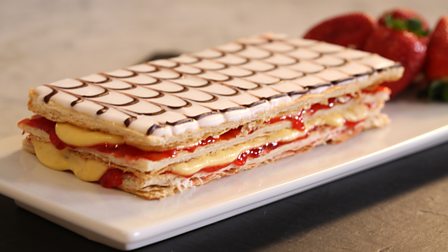
You need JavaScript to view this clip.
Preparation time
over 2 hours
Cooking time
10 to 30 mins
Serves
Serves 6
Recommended by
6 people
Dietary
Layers of light, golden pastry, creamy vanilla custard and home-made strawberry jam all topped with simple glacé icing. This cream slice makes a very special tea-time treat and is much easier to prepare than you might think.
To prepare the pastry, preheat the oven to 210C/400F/Gas 6½ . Cut a piece of baking parchment into a 40 x 30cm/16 x 12in rectangle and sift one tablespoon of the icing sugar lightly over the top.
Place the block of puff pastry in the middle of the baking parchment and, using a rolling pin dusted with more icing sugar, roll out so that the pastry is around 2cm/¾in larger than the parchment on all sides. Turn the paper rather than the pastry as you roll and it shouldn’t stick.
Lift the pastry on its baking parchment onto a large baking tray. It doesn’t matter if the pastry overlaps the edges slightly as it will shrink back as it cooks. Dust with another tablespoon of sifted icing sugar. Prick the pastry with a fork all over and place a second baking tray on top. This will stop it rising too much and helps it keep a nice even shape. Bake the pastry for 25-30 minutes, or until golden-brown and crisp.
Take the trays out of the oven and leave to cool for five minutes before removing the top tray. While the pastry is still warm, trim the edges with a sharp knife to neaten. Cut the pastry into three identical rectangles, each approximately 11 x 24cm/4¼ x9½in. Leave to cool completely. This shouldn’t take more than 30-40 minutes.
To make the jam, put the strawberries and lemon juice in a small non-stick saucepan and place over a medium heat for two minutes, stirring until the strawberries begin to soften. Add the jam sugar and stir constantly for about 30 seconds, or until the sugar has dissolved.
Increase the heat and boil for 4-5 minutes, stirring occasionally, until the jam reaches setting point.
To check whether the jam is ready, remove the pan from the heat and spoon half a teaspoon of the jam onto a cold plate. Leave it to cool for one minute. If it wrinkles when you push it with your finger it has reached setting point. Transfer the jam to a small heat-proof bowl and leave to cool. If it hasn’t reached setting point, continue to simmer and test again.
To make the crème pâtissière, put the egg yolks and caster sugar in a bowl and whisk with electric beaters until pale and creamy. Whisk in the flour and cornflour until smooth. Put the milk into a medium non-stick saucepan. Scrape the vanilla seeds out of the pod into the milk and bring to a simmer. (Watch carefully so it doesn’t get a chance to boil over.)
Remove the milk from the heat and gradually add to the egg mixture, whisking constantly with a large metal whisk until it is thoroughly incorporated. Tip back into the saucepan and cook for 8-10 minutes over a low heat, stirring constantly with a wooden spoon until very thick and smooth. There shouldn’t be any floury taste remaining.
Spoon or pour the custard into a medium heat-proof bowl and cover the surface with clingfilm to prevent a skin forming. Leave to cool for 45-60 minutes. Lightly whip the cream until soft peaks form when the whisk is removed in a clean bowl. Stir the custard to loosen it and fold in the cream.
When you are ready to assemble the millefeuille, place one of the pastry pieces onto a board or platter and spread over half of the jam, leaving a 1cm/½in border of pastry around the edge. Using a large spoon, dot half of the crème patissiere over the jam and smooth evenly with a metal palate knife. Place a second piece of pastry on top and repeat the process. Top with the final pastry rectangle, with the flatter side facing upwards.
To make the glacé icing, sift 200g/7oz of the icing sugar into a large mixing bowl and stir in the lemon juice and one tablespoon water. Mix until smooth and set aside. The icing should have a soft dropping consistency without being too runny.
Into another mixing bowl, sift the remaining icing sugar and the cocoa powder. Stir in two teaspoons of cold water to form a smooth paste. Transfer the chocolate icing to a small disposable piping bag or polythene sandwich bag.
Using a palate knife spread the white icing over the top of the pastry, going right to the edges. Tap the board holding the millefeuille gently on the work surface a few times to help the icing settle smoothly. Working quickly, snip off just the very end of the piping bag and pipe four thin lines of chocolate icing, evenly spaced apart, down the length of the mille feuille. (You can also do this with a piping bag fitted with a very small plain writing nozzle.)
Starting roughly 2cm/¾in in from one end of the rectangle, drag a skewer towards you through the icing from one short side to the other, to create a simple feather effect with the icing. Repeat the skewer lines a further 10 times, spacing 2cm/¾in apart, across the millefeuille until the top is decorated with a delicate feathery chocolate icing.
Chill the assembled millefeuille for several hours or overnight in the fridge. When you are ready to serve, use a very sharp knife to cut into six slices, holding each side of the millefeuille lightly to prevent the layers separating.
Use readymade strawberry or raspberry jam if you prefer.

By Paul Hollywood
See more millefeuille recipes (15)
Recipes from this episode